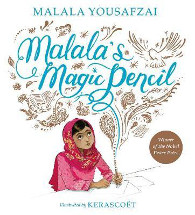Malala's magic pencil by Malala Yousafzai

Ill. by Kerascoet. Puffin, 2017. ISBN 9780241322567
(Age: 5+) Highly recommended. Themes: Education. Prejudice. Women's
rights. Taliban. Nobel Peace Prize winner, Malala Yousafzai, has
made her amazing story available to younger readers in this
outstanding picture book, Malala's magic pencil. Malala came
to worldwide attention when a terrorist attempted to kill her in
2012. She had promoted the education of girls in war-torn Pakistan,
writing under an assumed name for BBC Urdu. In this book we see how
girls are imposed upon by the growing threat of the Taliban in her
city.
Malala loves watching a TV show about a boy with a magic pencil, who
when hungry would draw something and eat it. Malala wishes she had
such a pencil, and put a lock on her door, or nullify the terrible
smells from the rubbish dump. But one day taking rubbish to the dump
she sees young children scavenging for rubbish to sell. She talks to
her father and is saddened to hear that some children never go to
school, and girls in particular are kept home to work. She longs for
a magic pencil to make the world a safer place, one in which girls
can all be educated. But then men with guns appear in their streets
and impose more burdens upon women. Malala notices fewer girls
coming to class and so she begins to write. Her voice is heard all
over Pakistan and further, she gives talks around the country,
visiting remote communities and speaking to a television reporter.
She is amazed that people want to hear her story. But some people
are not happy and try to stop her. They fail.
Living now in Birmingham her voice is a constant reminder of what
oppression looks like and how important it is to stand up for
women's education.
She found her magic pencil and is using it for the promotion of
peace in our world.
This magical story is beautifully illustrated by Kerascoet, a
pseudonym for French husband and wife team, Sebastien Cosset and
Marie Pommepuy using pen and watercolour to recreate the life of
Malala. In the detailed background readers will espy lots of
information about living in Pakistan, which will both inform and
delight. Information is included at the end of the book about
Malala's life and work, while a letter from Malala to her readers is
included. I found this a moving and personable story and went back
to the first book she wrote of her experiences, Malala:
the girl who stood up for education and changed the world (Indigo,
2014) as I am sure others will. I was blown away by her understated
reference to what happened to her when she was shot, underlining the
insignificance of the Taliban against the global importance of
education and peace. In a classroom this book would make a study of
its own, involving such themes as life in Pakistan, peace and the
Nobel Peace Prize, the role of the United Nations, extremism,
women's education, amongst others.
Fran Knight